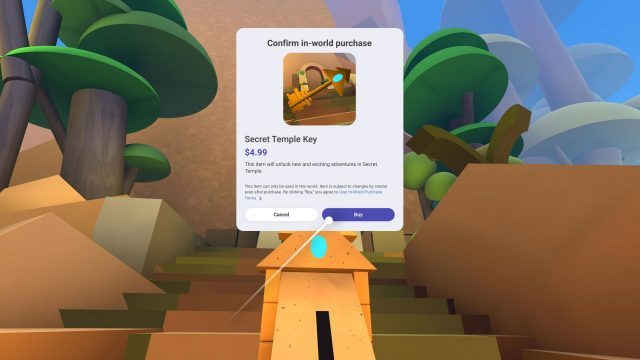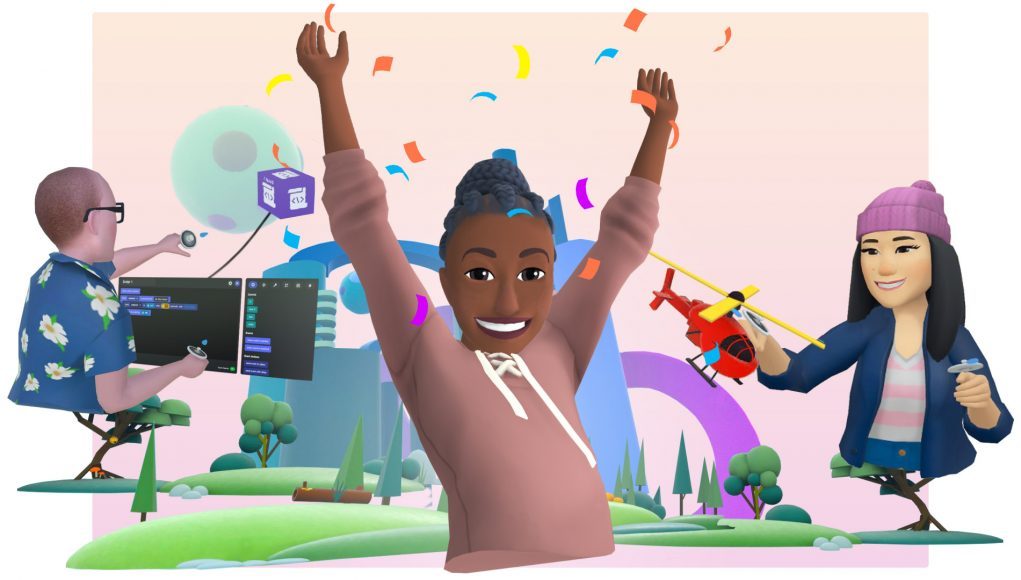This week Meta announced that it was beginning to test selling tools so that creators can sell things inside of Horizon Worlds and earn real money. Now the company has offered up more detail about how that will work, including the fees creators will pay on earnings made through the platform.
Meta says the goal of its various metaverse initiatives is to one day allow people to “earn a living” from creating virtual goods through its platforms. But for creators to make that happen, they’ll need to contend with hefty fees from the company.
Speaking to Road to VR about the new selling tools being made available to select creators in Horizon Worlds, Meta explained that anything sold in Horizon Worlds would be subject to the same 30% fee the company charges developers selling apps through its VR platform and then an additional 25% fee on top of the remaining amount. The company provided the following example:
“…if a creator sells an item for $1.00, then the Meta Quest Store fee would be $0.30 and the Horizon Platform fee would be $0.17, leaving $0.53 for the Creator before any applicable taxes.”
That’s an effective rate of 47.5% of anything sold on Horizon Worlds to Meta, leaving 52.5% to the creator.

That’s a pretty hefty take, but not entirely out of line with contemporaries. Roblox, for instance, takes between 30% and 70% of the revenue generated by creators depending upon whether the creator sold the item directly to customers or if the item was sold on the Roblox marketplace or by another party.
These are big fees, no doubt, but creators are getting something in return. Horizon Worlds, for instance, offers up its self-contained collaborative building tools, access to an audience, and handles all hosting and networking costs associated with the things creators build. Whether that’s worth 47.5% of what someone manages to sell on the platform is going to be up to the creator.
The Horizon Worlds fee structure strikes a sharp contrast to the thoughts Meta CEO Mark Zuckerberg shared about a theoretical metaverse back at Connect 2021:
The last few years have been humbling for me and our company in a lot of ways. One of the main lessons that I’ve learned is that building products isn’t enough. We also need to help build ecosystems so that millions of people can have a stake in the future, can be rewarded for their work, and benefit as the tide rises, not just as consumers but as creators and developers.
But this period has also been humbling because as big of a company as we are, we’ve also learned what it is like to build for other platforms. And living under their rules has profoundly shaped my views on the tech industry. Most of all, I’ve come to believe that the lack of choice and high fees are stifling innovation, stopping people from building new things, and holding back the entire internet economy.
We’ve tried to take a different approach. We want to serve as many people as possible, which means working to make our services cost less, not more. Our mobile apps are free. Our ads business model is an auction, which guarantees every business the most competitive price possible. We offer our creator and commerce tools either at cost or with modest fees to enable as much creation and commerce as possible.
Meta also clarified some other things about how the selling tools in Horizon Worlds will work. Speaking to Road to VR, the company said that, from the buyer’s standpoint, purchases in Horizon Worlds are handled like anything else on the Quest platform (ie: they use the headset’s account and payment credentials on file to handle the transaction). That means that items will be advertised and transacted with local currency, rather than a proprietary app-currency.
As for the transportability of items bought in Horizon Worlds, Meta says that anything buy can currently only be used in the world in which it was purchased. So if you buy a hat in one world, you only have access to it when you’re inside that specific world.
A photo provided by Meta also gives us some hints about the mutability of the things you purchase in Horizon Worlds, with the fine-print of the transaction pop-up warning that items are “subject to changes by creator even after purchase.” The pop-up also mentions a set of ‘User in-World Purchase Terms’, of which we’ve asked the company for a full copy.
Meta says it plans to gather feedback on the Horizon Worlds selling tools and the structure of item ownership, and evolve the offering over time. At present, only select creators have access to the selling tools, but the company expects to expand access over time.







